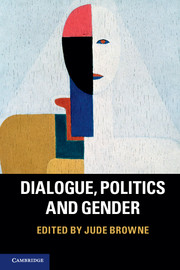Book contents
- Frontmatter
- Contents
- List of contributors
- Acknowledgements
- Introduction
- 1 Women and the standpoint of concrete others
- 2 Gender, discourse and non-essentialism
- 3 Universalism in feminist international ethics
- 4 Language, gender, dialogue, ethics
- 5 Between consensus and deconstruction
- 6 Trapped in a family portrait?
- 7 Gender, gesture and garments
- 8 What kind of dialogue do we need?
- 9 Deliberation, domination and decision-making
- Index
- References
3 - Universalism in feminist international ethics
Gender and the difficult labour of translation
Published online by Cambridge University Press: 05 August 2013
- Frontmatter
- Contents
- List of contributors
- Acknowledgements
- Introduction
- 1 Women and the standpoint of concrete others
- 2 Gender, discourse and non-essentialism
- 3 Universalism in feminist international ethics
- 4 Language, gender, dialogue, ethics
- 5 Between consensus and deconstruction
- 6 Trapped in a family portrait?
- 7 Gender, gesture and garments
- 8 What kind of dialogue do we need?
- 9 Deliberation, domination and decision-making
- Index
- References
Summary
Without translation, the very concept of universality cannot cross the linguistic borders it claims in principle, to be able to cross. Or we might put it another way: without translation, the only way the assertion of universality can cross a border is through a colonial and expansionist logic.
Judith ButlerThe question of universality is at the heart of debates in international ethics, both feminist and non-feminist. For some ethical theorists, there can be no such thing as an international ethics without the presumption of strong moral universalism. For others, it is the absence of moral universalism that is the starting point for international ethics. Yet again, for many ethical theorists, the task for international ethics is to establish some kind of middle way between ‘cosmopolitan’ (universalist) and ‘communitarian’ (particularist) alternatives. Debates over moral universalism are, of course, not new. Neither are they peculiar to those of us concerned with the domains of international, world or global politics. Nevertheless, when the ethical issues with which one is dealing are relevant to the latter domains, issues of universality as a matter of both the ground and scope of moral judgement become particularly salient. One cannot address questions about transnational distributive justice, the ethics of war or other kinds of cross-border intervention without addressing the issue of whether answers to such questions can be meaningful and/or authoritative transnationally, across boundaries of culture and power. This chapter examines the arguments of thinkers concerned with how to authorise moral judgements across these kinds of boundaries, beginning with Hegel.
- Type
- Chapter
- Information
- Dialogue, Politics and Gender , pp. 81 - 106Publisher: Cambridge University PressPrint publication year: 2013
References
- 1
- Cited by



